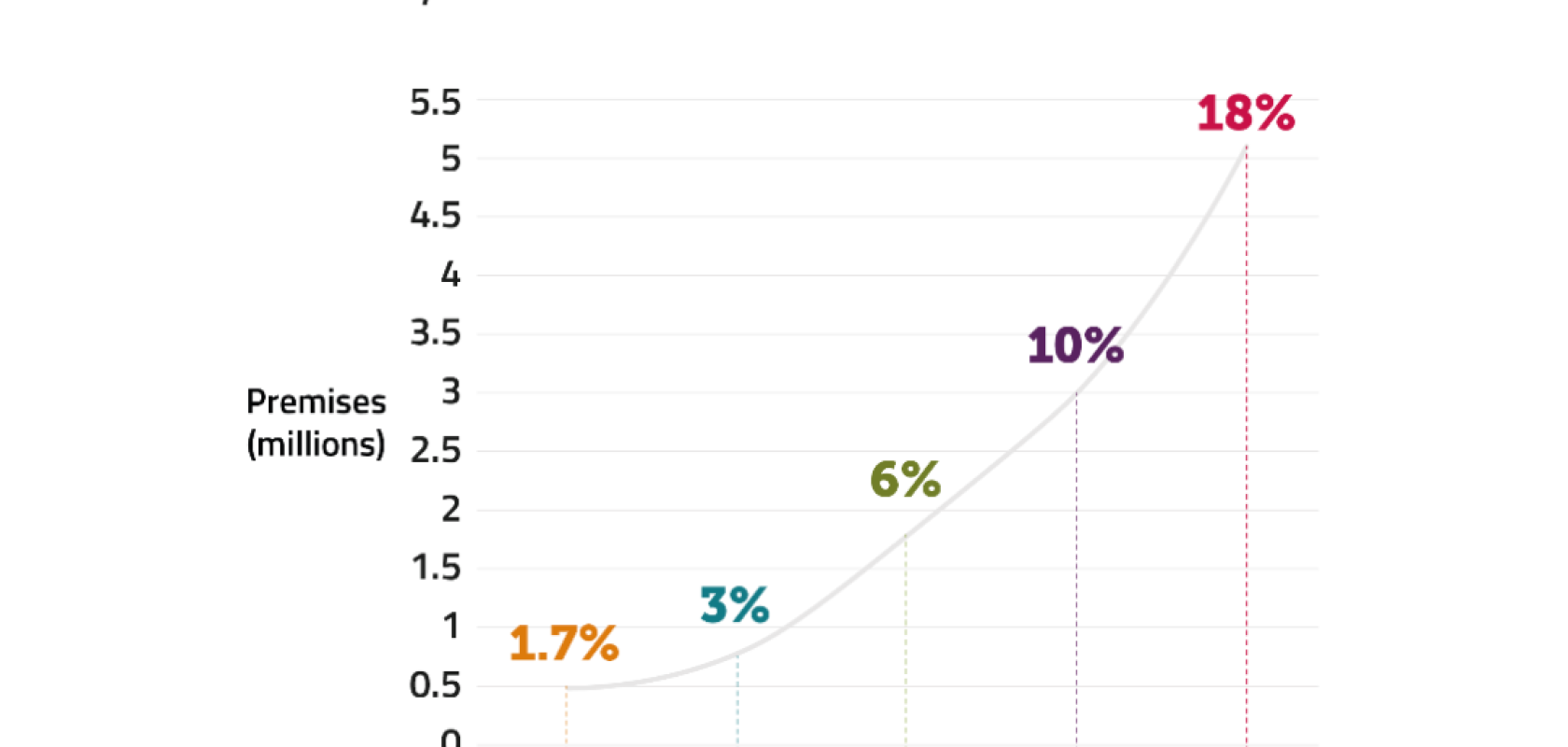UK telecoms regulator, Ofcom has confirmed how it plans to regulate the wholesale telecoms markets for the next five years and beyond.
It believes its new measures will lead to properties in around 70 per cent of the UK having a choice of networks from competitive commercial roll-out.
These measures, which apply from next month until March 2026, will include wholesale price regulation that encourages investment and promotes competition. In a press release the regulator said: ‘Over the last few years, we have brought down the wholesale price Openreach charges retail providers for its entry-level (40 Mb/s) superfast copper broadband service, in line with its falling costs. We are now keeping this price – and the prices of slower copper broadband packages – flat in real terms.’
In addition, Openreach’s fastest fibre services will continue to be free from pricing regulation. Ofcom said that this is because the ability of networks to raise wholesale prices significantly for the faster, unregulated products is constrained by the fact that people can choose the entry-level service as an alternative. Openreach will also be able to charge a bit more for regulated products that are delivered over full fibre instead of copper under the regulations. This, said the industry watchdog, reflects the fact that full fibre is consistently faster, and much more reliable, than copper-based broadband and improves the investment case for BT and its rivals by providing them with a margin to build the new networks.
Said Ofcom: ‘We recognise that full fibre is a long-term investment, taking more than a decade – if not two – to pay back. So, we aim to allow all companies the opportunity to achieve a fair return over their whole investment period, and do not expect to introduce cost-based prices for fibre services for at least 10 years.’
The regulator has also outlined that it will progressively remove regulation on Openreach’s copper products over a number of years when the infrastructure provider has rolled out full fibre in a particular area. This is to remove the costs associated with running two parallel networks and, said Ofcom, will improve the business case for Openreach to invest, by removing the need for it to maintain two networks, while promoting the take-up of faster fibre services.
The industry watchdog also reiterated that it has ‘already levelled the playing field’ by allowing BT’s rivals better access to Openreach’s underground ducts and telegraph poles, which, it said can halve the upfront costs of connecting a home. ‘Order volumes last year to use this infrastructure covered over 23,000km of duct and over 140,000 poles, up from 2,500km and 12,000 respectively the previous year,’ said Ofcom in its press release.
Ofcom said that it will prevent Openreach from ‘harming competition’, by reviewing all long-term discount agreements it offers its wholesale customers, and restricting them if they could stifle investment by its rivals. Openreach will also continue to be prohibited from offering geographic discounts on its superfast broadband wholesale services and this will be extended to full fibre.
Dame Melanie Dawes, Ofcom chief executive, commented: ‘Over the past year, being connected has never mattered more. But millions of homes are still using the copper lines that were first laid over 100 years ago. Now it’s time to ramp up the roll-out of better broadband across the UK. We’re playing our part – setting the right conditions for companies to step up and invest in the country’s full-fibre future. This is a once-in-a-century chance to help make the UK a world-leading digital economy.’
In response
Philip Jansen, chief executive at BT Group has responded to the announcement, saying: ‘This is good news for all fibre providers in the UK. For us, it is the greenlight we’ve been waiting for to get on and build like fury. Full fibre broadband will be the foundation of a strong BT for decades to come and a shot in the arm for the UK as we build back better from this pandemic. Connecting the country has never been more vital.’
Clive Selley, CEO at Openreach stated: ‘We’ve now passed almost 4.5 million premises and are building faster, at lower cost and higher quality than anyone else in the UK. Today’s regulation will allow us to ramp up to 3 million premises per year providing vital next generation connectivity for homes and businesses right across the UK.’
Malcolm Corbett, CEO at the Independent Networks Cooperative Association (INCA) commented: 'While government recognises the importance of the competitive market, Ofcom seems fixated only on incentivising BT to invest, dismissing the majority of altnets as bit players, recognising few of their concerns in the market review statement. If operators and their investors believe that the regulator is not willing to listen to their concerns and act on them it risks delaying deployment and undermining the government targets, particularly in more challenging rural areas. Under plans to cover the hardest to reach areas, government fully expects a range of "altnets" to bid for contracts in the BDUK programme, alongside BT Openreach and increasingly substantial independent players like CityFibre. On the other hand, Ofcom, whilst recognising "that smaller altnets play an important role in providing fibre to rural areas" serving "rural communities at a time when Openreach has not been willing to extend its network," does not view the same altnets as capable of providing significant competition to BT – in the same hard to reach areas.'
Greg Mesch, CEO at independent network provider, CityFibre commented: ‘This regulation will promote and protect the infrastructure competition that is enabling Britain to go full speed ahead for full fibre.’Ofcom’s Market Review is the culmination of its strategy, using competition to drive full fibre investment and nationwide coverage. It will inspire confidence and unleash a decade of innovation and investment from competitors like CityFibre, rebalancing market share away from incumbents and driving better services and prices for wholesale customers and consumers. Competition has already driven huge progress with full fibre roll-outs underway to millions of UK homes and businesses. With Ofcom setting out a comprehensive framework for at least the next five years, we can now go both further and faster, playing our part to deliver the full fibre networks that will underpin the UK’s economy and society for generations to come.’
Gareth Williams, CEO at independent rural broadband provider, Gigaclear stated: ‘We welcome the publication of Ofcom’s Wholesale Fixed Telecoms Market Review. Whilst we will need time to review the document in its entirety, we’re glad to see that Ofcom has aligned charge controls across areas 2 and 3, which supports investment in rural fibre operators. We were also pleased to see that Ofcom has listened to industry concerns regarding the operation of the dark fibre interexchange (DFX) remedy. We will take the time to fully assess the details of today’s proposals and will continue to engage with Ofcom and government regarding the implementation of the measures set out.’
Lloyd Felton, chief executive of independent provider, County Broadband's response was: 'We welcome the Government’s flagship Project Gigabit to turbocharge the rollout of future-ready full-fibre broadband. We’re confident of seeing continued enthusiasm among private investors to keep pace with rising demand. While many local communities may consider their broadband to be adequate for now, the tide is changing and our data demands are surging. Full-fibre networks aren’t built overnight so if we don’t act now many people will find themselves digitally stranded sooner than they might think, with existing connections reaching their expiry date. We know Boris Johnson is relying on local providers like us to achieve the watered down but more realistic 85 per cent target for UK-wide gigabit-capable broadband by 2025. We look forward to working with the government on banishing current copper networks to the history bin and we’ll continue to make clarion calls to stop copper networks being marketed as "Superfast fibre", which only creates confusion for the consumer.'
Graeme Oxby, CEO at alternative provider, Community Fibre added: 'Alternative networks have already raised nearly £8bn to invest in the UK's full fibre network so that we can provide consumers a different choice from BT Openreach. I'm glad that OFCOM recognises the criticality of access to Openreach's ducts and poles which allows operators like Community Fibre to deploy its 100 per cent full fibre network without disrupting our communities by digging up roads and streets. We were surprised to see the regulated prices for these services going up over time, contrary to Ofcom's consultation document last January and we will have to do some more work to understand Ofcom's rationale for this change.'
Paul Stobart, CEO of UK ISP, Zen Internet responded: ‘The 2020s is undoubtedly going to be the decade of full fibre. Ofcom’s decision to regulate the pricing for further roll-outs in the UK, in line with previous guidelines, is something that we welcome at Zen. The benefits of full fibre are undeniable for the UK and make regulations such as this increasingly important for enabling and supporting the likes of Openreach to be able to invest in its infrastructure at pace. In particular, this will help connect the people that need it, especially those in rural areas that are at risk of being left behind. As well as this, Ofcom’s decision to enable increased access to Openreach’s telegraph poles and underground cable ducts for alternative providers is a positive step for consumers. In order for the UK to truly ensure everyone has access to choice, value and quality when it comes to connectivity, the industry needs increased competition and investment. This is something alternate providers like CityFibre will undoubtedly supply.’


